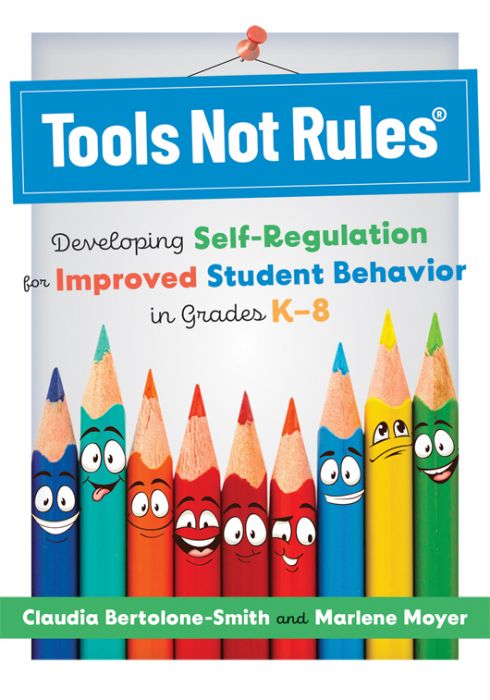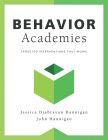
Tools Not Rules®
Developing Self-Regulation for Improved Student Behavior in Grades K–8
Engage your students in monitoring, understanding, and improving their behavior using the Tools Not Rules® (TNR) approach. By limiting isolation, shame, and judgment from the choices students make, this approach allows students to honestly assess and effectively regulate their behaviors. With helpful strategies and thoughtful language, teachers using TNR can create a welcoming and encouraging environment for students to learn, improve, and excel.
Discover the Tools Not Rules® approach to better student behavior
Engage your students in monitoring, understanding, and improving their behavior using the Tools Not Rules® (TNR) approach. By limiting isolation, shame, and judgment from the choices students make, this approach allows students to honestly assess and effectively regulate their behaviors. With helpful strategies and thoughtful language, teachers using TNR can create a welcoming and encouraging environment for students to learn, improve, and excel.
K–8 teachers and administrators can use this book to:
- Promote a healthy educator mindset that recognizes students are more than the choices they make
- Increase positive connections with students by helping them diminish behaviors getting in the way of academic success
- Develop an effective and reliable plan for working with behaviors that hinder student learning
- Encourage honesty to develop students’ accountability regarding their behavior choices
- Employ diverse strategies to promote students’ behavior awareness and self-regulation
- Improve the classroom community and learning environment through the use of a novel approach to changing whole class and individual student behavior
- Adopt thoughtful language that facilitates constructive self-assessment and improvement
- Build an empathetic community among students, recognizing that everyone can choose unproductive behaviors and then change to more effective ones
Related Topics
Classroom Management & BehaviorSocial-Emotional Learning
Additional Information
“Students who can regulate their emotions are better equipped to focus, think critically, engage in effective problem solving, and persevere in their academic pursuits. This powerful book, written by practicing educators, provides teachers with useful structures and strategies to help students maintain motivation, cope with adversity, and bounce back from failures. It is a fantastic addition to the field of education.”
“Tools Not Rules is a rare gem in the realm of must-reads for educators! Authors Claudia Bertolone-Smith and Marlene Moyer have leveraged their teaching experience and research to create an applicable classroom management system that optimizes learning and cultivates a class culture in which students are authentically invested in their own learning and behavior. The Tools Not Rules approach promotes honesty, accountability, and humanity. Educators and students alike will find that these strategies nurture their social and emotional well-being, thus enriching the teaching and learning experience for all!”
“If it weren’t for Marlene introducing me to Tools Not Rules and bringing it into our middle school, I would not be teaching today. It has saved my career. I have implemented TNR for the last 10 years, seven years as a middle school teacher and three as a first-grade teacher. The empowerment it gives students to identify their negative behavior and understand what they need to change is astounding. If students do not get a chance to identify and understand what is behind their behaviors, they will never change, and the negative patterns will continue. Every day, we chant that we are serious, assertive, hard-working students . . . All I need to ask my students is, ‘Does your current behavior lift you up or weigh you down?’ They identify it, we discuss it, they change it, and we get to work. There is no shaming or blaming; it’s honesty above anything else!”
“As the principal of a school with 900 students and 40 teachers, I can honestly say that Tools Not Rules made a huge difference! Teachers weren’t just managing behavior—they were building stronger connections with students and collaborating to make their classrooms more positive and productive. Teachers, students, and administrators were on the same page, speaking the same language, and working toward a common goal—creating a safe, welcoming, and supportive environment. This approach gave us a clear, actionable way to improve student behavior and engagement. But more importantly, it helped strengthen our sense of community. Our team supported each other to make our school a place where everyone can succeed!”
“Tools Not Rules is a revolutionary approach to creating a strong classroom culture. It leverages the critical social and emotional aspects that frame learning to create an environment that cultivates student belonging and success. Within this approach, honest classroom culture and positive student-teacher relationships serve as the building blocks for success. Autonomy and responsibility are developed through self-regulation, skill mastery, as a sense of self-efficacy, giving students a sense of pride in their accomplishments. Students develop ownership for their learning and become empowered to believe in their own ability to grow and change.”





